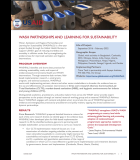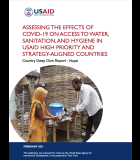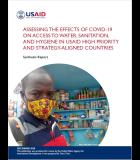Knowledge-Based Integrated Sustainable Agriculture and Nutrition Project (KISAN)
The KISAN project, part of USAID’s global Feed the Future (FTF) initiative, is a $20 million five-year program working to advance food security objectives by increasing agricultural productivity. Nepal was one of 19 countries chosen for the Presidential FTF Initiative in 2010. KISAN builds the capacity of private sector and community based organizations to improve the availability of quality farm inputs; increase access to credit, extension and other services; and improve the competitiveness and efficiency of processors and other buyers. In parallel, KISAN facilitates market linkages between farmers and input providers, service providers, and buyers. KISAN engages with a wide range of public, private, and civil society stakeholders including farmers, NGOs, academic and research institutions, businesses and training centers. The project works in close coordination with the GoN’s Ministry of Agricultural Development (MOAD) and is aligned with the other FTF projects in Nepal, including the Cereal System Initiative for South Asia (CSISA) and the Innovation Lab (IL) programs. KISAN collaborates with USAID’s Business Literacy Program – which is increasing the business literacy of 53,000 KISAN beneficiaries – and with USAID’s Suaahara project, which is improving the health and nutrition of Nepalis within KISAN’s focus districts.
Activity Description
- Enhance the agro-input distribution system by building the capacity of private sector input suppliers and other service providers, and by strengthening sustainable supply chain mechanism.
- Improve farm yields by building awareness and promoting the uptake of proven small-scale irrigation and mechanization technologies.
- Work with farmers and farmer groups both directly and through private sector partners to build their understanding of commercial agriculture.
- Support and train private sector and public sector change agents to deliver extension services, disseminate best agribusiness management practices, scale up appropriate technology including irrigation systems, and provide access to credit.
- Support scaling-up of proven agricultural technologies.
- Strengthen rural markets (including collection centers) and improve farmer access to markets.
- Through KISAN’s grants program, support agribusinesses involved in mechanization, irrigation, processing, and other areas to expand their customer base, geographic reach, products, and direct and indirect services to farming households.
Expected Outcomes
- Improve agribusinesses’ capacity to provide technical services and products directly to farmers.
- Improve the efficiency of rural markets and households’ access to markets.
- 100,000 households are trained in improved and sustainable agriculture production and post-harvest technologies and practices.
- Ensure that sustainable agriculture productivity technologies and practices are adopted on at least 60,000 hectares of land.
- Facilitate the production of at least 1,000 tons of high quality seed and access to irrigation by more than 940 farmer groups.
- Facilitate access to financial services, including credit, of 80% of project beneficiary households.
- Value of incremental sales: $220 million
Actual Outcomes
- 83,286 farmers trained and now implementing improved agricultural practices and technologies on 60,713 ha.
- Increased yields for rice, maize, lentil and vegetables from 29 to 91 percent.
- $71.8 million in farm-level incremental sales for target commodities.
- Improved gross margins for target commodities by 38 to 160 percent.
- Implemented cost-sharing PPPs with 6 agribusiness targeting 11,600 farmers.
- 12-18% increase in HH level consumption of nutrient rich vegetables.





